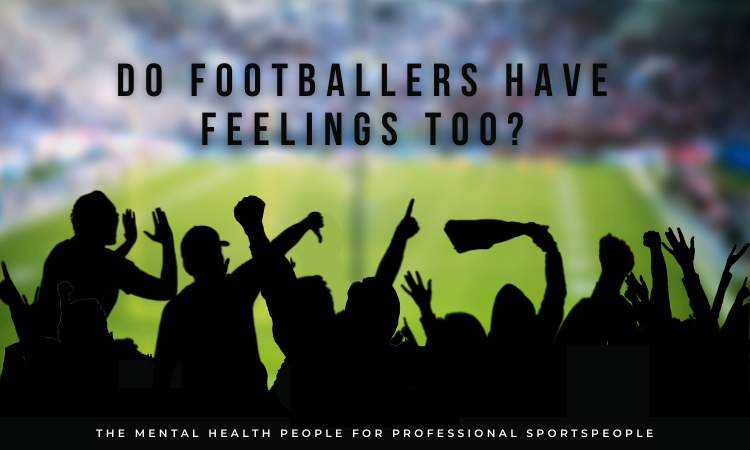Do Footballers have Feelings Too?

Guest writer - Alex Mills, Head of Education, Sporting Chance.
Mental Health is about how our thoughts and feelings impact us, how they shape how we perceive the world around us. Our mental health can be good at times, at other times we can experience poor mental health where we really notice or are impacted by certain feelings or moods. These feelings can last for a week or so and pass, sometimes they can last months or even years, sometimes they’re connected to certain events that have happened or are still happening, sometimes they’re not connected to anything we can put our finger on at all.
Most of us can read the bit above and acknowledge we’ve experienced poor mental health to some degree. But do all we acknowledge that footballers experience poor mental health too?
Sporting Chance is the largest provider of mental health treatment services to professional footballers in the UK. We provide a safe, confidential space to players across the game – a 24/7 helpline they can call to talk through any concerns they are having and if they want to, we can link them up with a therapist near their home or training base so they can work through any issues face to face. We’ve been doing this for over twenty years now, so we’ve got lots of experience of working with players across different leagues as well as those that have retired from playing.
Whenever I talk about the work we do to a member of the general public, I get lots of different reactions. Generally, people have sympathy with younger players, especially those released from academies at a young age who struggle to cope with feelings of loss and rejection. People can also understand why players with long term injuries would feel low and need support to help them through a period of huge uncertainty and worry and without the one coping mechanism that’s always made them feel better since they were young – playing football.
However, lots of responses aren’t so understanding – just check out comments under newspaper articles or on social media posts next time there’s a story about a footballer’s mental health. They often show a complete lack of compassion for players in a way that’s different from how we’d respond to a friend or family member saying their struggling. When then England and Everton winger Aaron Lennon was detained under the Mental Health Act by a motorway near Manchester in 2017, the Daily Mail made the very first words of their breaking tweet a reference to his salary.

“What have they got to be sad about, they’re earning loads of money?” It’s true that professional footballers at the top levels in the game in the UK get paid very well for the job they do. It’s also true that there are millions of people across the world whose poor mental health is directly related to a lack of money, sometimes a lack of access to even the most basic resources. We can see this is at the moment in the faces of those suffering in the Ukraine, and when we put these two things together – people who have nothing are sad, footballers who have ‘everything’ are sad, for some people this doesn’t make sense. “They should try living in the real world, then they’d have something to be sad about”.
If being a footballer in some way vaccinated you from having poor mental health, if having money vaccinated you from having poor mental health, then why do we receive calls from over 600 professional players a year who reach out for help? Some players later tell us that picking up the phone or texting us is the hardest thing they’ve ever done, so we can assume they must have been go through a lot of pain in order to take that step.
As hard as it may be for some people to understand, it’s not true that status or money gives us immunity from problems or thoughts and feelings that cause us to find life hard going. We help players whose wives have been diagnosed with cancer, we help players who are dealing with the death of a young child. Do we understand that they would find these situations emotionally difficult or does being a footballer make those things disappear? If money is the answer, should they simply go out and buy a new car to get over it?
I’ve also used some extreme examples here, but in reality, once we have taken time to think about how these very difficult things happen to footballers and they might need support with their mental health because of these things, maybe we can begin to see them as human beings more generally, to imagine them having emotions about other things too, rather than simply being robots whose feelings are only important to us for 90 minutes each week. We expect players in our team to feel angry when a decision goes against them, to feel frustration when they miss a chance, to feel a sense of failure when they are relegated. But these players use exactly the same brain at home as they do on the pitch, they don’t swap it with a different one after the match. They experience anger and frustration and a sense of a failure in other areas of their lives in the same way that you and me do.
Not only that, but footballers also have to deal with lots of things that you and I don’t. I don’t receive abuse on social media when I have a bad day at work. I don’t receive abuse from thousands of people every other weekend just because I’m playing for the away team. I can talk about feeling sad or lonely or insecure without people saying – “But why? You have loads of money?”. Anxiety around change - in management, moving teams, stress and insecurity over contracts, pressure surrounding performance and anger and isolation after retirement are repeating themes for us as a treatment provider. “All professional sport is a fiercely competitive environment and performance and results are often the primary or sometimes solitary basis of an athlete’s self-worth” says Sporting Chance’s Clinical Lead, Craig Dexter. “That can leave some of the footballers we work with in quite a vulnerable position, particularly if the high levels of scrutiny and attention they have to contend with has limited or shrunk a player’s support network. We often work with players who have a heightened awareness of the criticism being directed at them, and it’s understandable when this manifests in presentations of low self-esteem. This in turn can impact negatively on their performance and confidence and the criticism and abuse will just ramp up even more. It’s a cycle we see time and time again”.
There is a perception that as soon as someone makes it as a professional footballer, they are supplied with a personality that means they can deal with the lifestyle that comes with the territory. The reality is that footballers have one thing in common - they’re all good at football. Aside from that, there are lots of things that make them different from each other. They’ve been brought up in different parts of the world, have different personalities, had different childhoods, some will have experienced things at a young age that many of us couldn’t understand and have had to deal with loneliness and insecurity and pressure from parents and peers from a young age. They’re not all ‘strong’ just because they’re footballers, even if the world they inhabit means there is more pressure for them to act like they are. Just because they’re a footballer doesn’t mean they have an inbuilt ability to ‘shrug off’ abuse any more than you do. The only difference is that they probably have to experience it more than you.
This mental health week, if you’re going to a game, think about a family member or a friend who has been through a really difficult time in their life, who you know at one time felt scared or lonely or constantly anxious or utterly without hope. One of the 22 players in front of you will likely be going through something similar. Treat them as you would want your friends or family to be treated.
Alex Mills, Head of Education, Sporting Chance